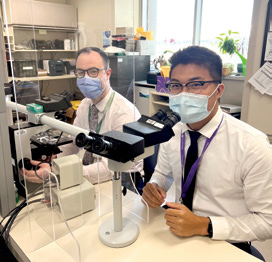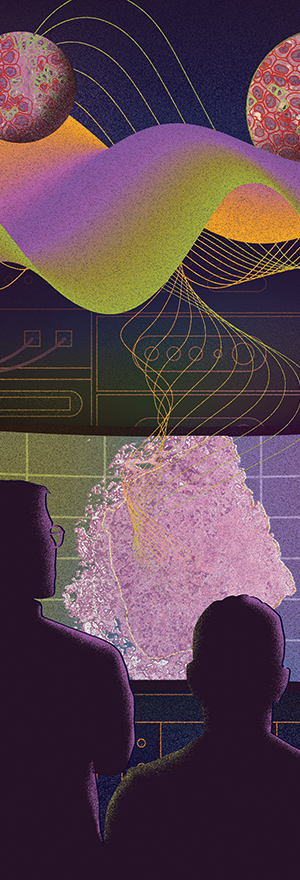The power of curiosity
Asking questions is at the heart of what Dr. Matthew Cecchini does. This curiosity and a whole lot of innovation served him well when setting up his new pathology lab and research program
By Jennifer Párraga, BA’93
 Dr. Matthew Cecchini, MD/PhD’14 (left) and Sherman Lin (right)
Dr. Matthew Cecchini, MD/PhD’14 (left) and Sherman Lin (right)
Dr. Matthew Cecchini, MD/PhD’14, and Sherman Lin share an innate sense of curiosity. It’s what brought them and a team of student researchers together under some rather unique circumstances.
As a result, the Cecchini Lab stands as a shining example of the dynamic research culture at Schulich Medicine & Dentistry and the innovative approaches faculty are using to engage students and learners from across all programs to expand their research horizons.
A convergence of circumstances
Their story begins in the spring of 2020, as Cecchini was completing a fellowship in pulmonary pathology at the Mayo Clinic. He had just accepted a role as an anatomical pathologist and Assistant Professor at Schulich Medicine & Dentistry, when two different circumstances converged.
The intensity of the pandemic was at one of its highest points at that time, creating uncertainty for the new clinicianscientist and his research and lab plans. The picture Cecchini had always had in his mind about how his research lab would function was not going to be possible. He started to transfer the focus of his research program to digital pathology and wondered what possibilities might exist to advance this work.
“I asked myself, could we build projects that could be done remotely to ask fascinating questions using publicly available datasets?” he said.
Focused on predicting cancer outcomes, Cecchini is particularly interested in using digital and molecular pathology to better understand disease. The clinician-researcher wanted this current focus to form the foundation of any project that was developed.
At the same time, he was receiving emails from undergraduate students wanting to gain research experience and to work with him.
“I put two and two together,” said Cecchini. “I realized that I could work with students and teach them pathology, and they could answer the questions that I was asking. At the same time, they would also be able to see the power of research and perhaps begin developing their own questions.”
Enter Sherman Lin, who at the time was a first-year medical sciences student. Lin had initially reached out to Cecchini in his search for a mentor and soon became one of the first students to join the research team.
Lin says that his love of asking questions complemented the pursuit of research; and his desire to pursue a career of service led him to consider medicine.
The project
Cecchini planned for the students to use Qupath, an open-source, digital image analysis program, to digitally identify cancer cells and develop novel tools. They could complete the work using their laptops at home and all training and meetings could be done using Zoom.
The team of two students soon grew to 15, and by the following year, there were 21. All students worked together using Zoom to connect. Within a few months, Lin took on a training role, in addition to the analysis that he performed daily.

Lin says that the project was not without obstacles, but the opportunity to reflect on the challenges and figure what might work was very satisfying.
“There were times when we had to think about what might work and test it. And if it worked, it was truly magical,” Lin said. “That’s what I want to have in my future. I want to be involved with novel ways to improve patient care.”
The original request that Lin made of Cecchini to serve as his mentor has also been fulfilled and continues today. “Dr. Cecchini is a great mentor. He has taught me a lot about being a good researcher, about never compromising the scientific story and the need to focus on the facts. I’m also inspired by his clinical work and his tremendous work ethic,” Lin said.
Sharing with the world
By the end of the summer of 2020, the research team had analyzed more than 300 slides and submitted 11 abstracts for presentation. Lin’s poster was also accepted to be presented at the United States & Canadian Academy of Pathology Conference in Los Angeles in March 2022 – the largest pathology conference in the world.
For Lin, attending a conference of such significance was thrilling and an incredible learning experience. Not only did he have the chance to present his work, but he also attended talks presented by leading pathologists and networked.
“Everyone thought he was a data scientist. He even received job offers,” Cecchini said with pride. “Sherman really excelled through the whole experience; he’s been a leader and ensured our success.”
Cecchini is equally proud of the entire team and says that students gained many skills beyond research through the unique experience.
“They learned how to collaborate with one another, how to work as a team, and how to leverage crowd wisdom,” he said. “It was an inspiring experience for me too. The best part of being a professor is seeing your students fly – it was an amazing feeling and so rewarding to see what they were able to accomplish.”
Cecchini freely admits that this may not have happened if there wasn’t a pandemic. “I don’t think that I would have gone this route,” he said. “But it’s how I see my lab going in the future.”
Today, Cecchini has a lab team of 24, including undergraduate, medical and graduate students. Saumik Biswas, PhD’20, a postdoctoral scholar, is working in the lab as well.
Attributing a lot of his current success to having early exposure to research, Cecchini is very enthusiastic to pay it forward and expose others to it. He believes that experiential learning, whether it is through research or other opportunities, empowers students to tap into their curiosity, ask questions and explore the environment for answers.
“I think that was the power of this project – we all came with questions and felt passionate about finding the answers.”
Cecchini Lab
Undergraduate Students
Sherman Lin
Djarren Maloles Tan
Jacobo Martinez Acevedo
Binit Pokharel
Samantha Keow
Michelle Pham
Tanya Misra
Victor Lam
Nina Wu
Eric Wang
Elissa Woo
Danielle Skeba
Medical Students
John Loggie
Joshua P. Samsoondar
Ela Bandari
Daniel Wilsdon
Han Wang
Pathologists’ Assistant MClSc Students
Joanna Pearce
Alexandria Smuland
Julie Richmond
Maria Arias Rodriguez
Helen Meng Di Ji
Graduate Student
Jen Coats
Postdoctoral Scholar
Saumik Biswas









